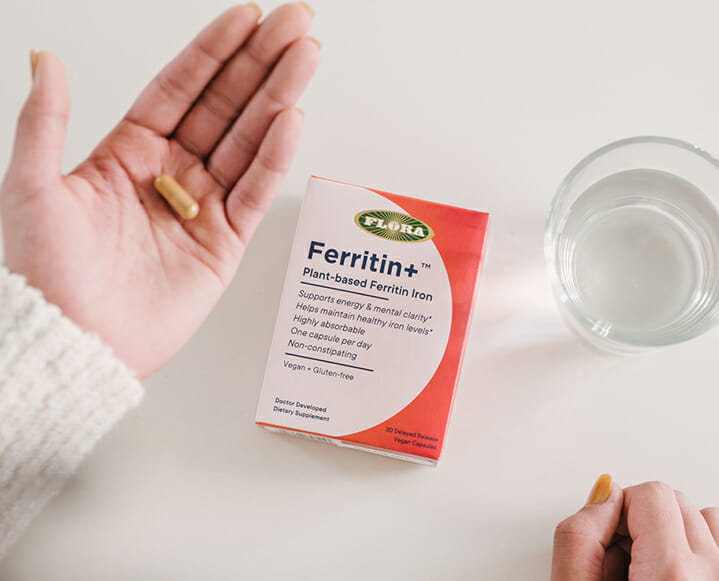There’s far too little education around the 4th trimester, the first few months after a woman gives birth. And yet, new mothers can have just as many specialized health needs at that time than through all of pregnancy — if not more!
Allison Oswald is a Board Certified Pelvic Specialist and Doctor of Physical Therapy. More than any specialist we know, Allison is a champion for women’s health in this crucial ‘fourth quarter’. If you’re pregnant, planning on becoming pregnant, or basically know anyone with a womb, take a moment and educate yourself on this important topic in women’s health.
This story is brought to you by Flora Ferritin+, a breakthrough iron supplement supported by 3 clinical studies and 11 patents with specific benefits for pregnant women. You’ve seen the Flora brand here before, a family-owned company with a legacy of beloved herbal products long before wellness was a trend.
Allison Oswald at Home with Flora Ferritin+
What the Heck Is the 4th Trimester?
The 4th trimester refers to the time just after birth to around 12-weeks postpartum.
Women are often told that whatever they are experiencing during postpartum is just ‘part of the process’. That may be true, but there is often a big knowledge gap between the average woman’s postnatal experience and the resources and education she needs.
These days physicians don’t always have the privilege of time with patients and some providers continue to brush off symptoms as “just part of pregnancy/postpartum”. Women often have to advocate for themselves, ask their tribe of mothers, and find support on their own. This can be exhausting, expensive and time consuming, typically things that new moms don’t have the bandwidth for.
My mission is to educate women and providers about the options and tools that exist so that more useful conversations can be had. This will make these subjects more approachable and women will feel more confident in asking for help. These types of support should not be a privilege, but rather thought of as essential.
The 4th Trimester: What New Moms Should Know
There are four common struggles in the 4th trimester, let’s look at them all.
First, I want all moms to understand how much healing is happening internally in their bodies! Sometimes, when we can’t physically see what’s happening, we don’t realize what our bodies need. The body is in a healing phase and needs rest, hydration, sleep, good nutrition and mental ease.
01 | address NUTRIENT DEFICIENCIES During the immediate postpartum, nutrition is a huge contributor to healing and restoring balance in the body.
With stress, interrupted sleep and less than optimal eating habits, I often see women suffering from anemia (low iron) postpartum. Some of this is also due to blood loss during delivery. Low iron can contribute to things like fatigue and mental fog during a time when everyday can already feel difficult enough. If you aren’t sure where your iron levels lie, get tested: Low iron can make recovery slower and more difficult. Flora Ferritin+ is perfect for anyone looking for a clinically proven, gentle, non-constipating iron supplement, including pregnant and nursing moms.
Made from organic peas, Ferritin+ uses the body’s own iron storage systems to store and build iron levels throughout the 4th trimester.
 Flora Ferritn+ | A breakthrough in iron supplementation for pregnancy and the fourth tri.
Flora Ferritn+ | A breakthrough in iron supplementation for pregnancy and the fourth tri.
02 | understand the basics of postpartum healing for both vaginal and cesarean births. This will support them with knowing what is considered “normal” and how they can improve their healing.
03 | Have Your Referrals Ready Most women wouldn’t think of not having their pediatrician set up ahead of time for their baby, and I feel the mother deserves the same consideration.
Women can have a list of referrals available should they need it for both physical and emotional support. Remember that many practitioners provide virtual support too, which might make it easier for some women. A few examples include:
+ Pelvic Floor Physical Therapist
+ Postpartum Doula
+ Maternal Mental Health Expert (therapist/psychologist)
+ Lactation therapist
04 | abdominal/PERINEAL HEALING After birth, women are dealing with wound healing (perineal or abdominal) that they haven’t had before if it’s their first time having a baby.
There is no way to know what that feels like ahead of time. So learning how to manage those incisions is important. They should know to ice frequently, have good toilet habits and be aware of signs of infection. Use a squatty potty, breath while gently pushing, and use a peri-bottle to cleanse vs. toilet paper. Supplementing with magnesium can be helpful for stool softening.
Frequent Sitz baths and frozen ‘padsicles’ (Maxi pad with witch hazel and a bit of water that have been frozen) are great tools to equip yourself with before birth.
05 | INCONTINENCE prep Immediately after labor, some women lose control of their bowel or bladder, this can also be very frightening. Women should know that this is common for a variety of reasons, but should progressively get better and completely resolve within a week or two.
06 | PROLAPSE awareness Prolapse, or the descent of the pelvic organ(s) through the vaginal canal may occur for some women due to the intensity or length of pushing during labor. Knowing how to manage that early on can give much better outcomes to women long term. They can do things like elevate their hips to reduce the effects of gravity, allow others to lift the baby for them and begin exercises to improve their symptoms to name a few.
07 | Hydrate often Period.
08 | Ask For Help + Create a Support List: Lastly, all women should create a list and have support lined up for the 4th trimester. This could be partners, parents, neighbors, friends, doulas, etc.
The mother is going through so much change physically, emotionally and psychologically during this timeframe that it’s important for her to feel like she can ask for help, and sometimes that means that others need to ask her first.
People on this list will check in with the mother throughout this time and she can also reach out to them if needed. Women never know what to expect during this time, so it’s important to have those conversations, ask for help ahead of time and know that you can change your mind at any time as well! Your support group should be ready to support you, whatever the needs may be.
09 | Get To Know Your Pelvic Floor I have three pillars of pelvic health that I feel all women should know:
Know how to STACK your body to allow for healing (this is alignment/posture). Know how to EXPAND your ribcage to improve diaphragmatic breathing (diaphragmatic breathing is a cornerstone for good pelvic floor function. COORDINATE your breath with your deep core and understand how to use your breath and pelvic floor functionally.
We’re grateful to Flora for partnering with us on this important topic. We support greater transparency and education for mothers during one of the most important transitions in a family’s life. Start by supplementing with Ferritin+, the plant-based, non-constipating new formula made with organic peas by Flora that is ideal for all four trimesters and also a key staple for women of all ages. Shop Flora for 20% off with CHALKBOARD20 and consider sharing this information with friends and loved ones.
This story is brought to you in partnership with Flora. From time to time, TCM editors choose to partner with brands we believe in to bring our readers special offers.
These statements have not been evaluated by the Food and Drug Administration. The Chalkboard Mag and its materials are not intended to treat, diagnose, cure or prevent any disease. All material on The Chalkboard Mag is provided for educational purposes only. Always seek the advice of your physician or another qualified healthcare provider for any questions you have regarding a medical condition, and before undertaking any diet, exercise or other health-related programs.

















